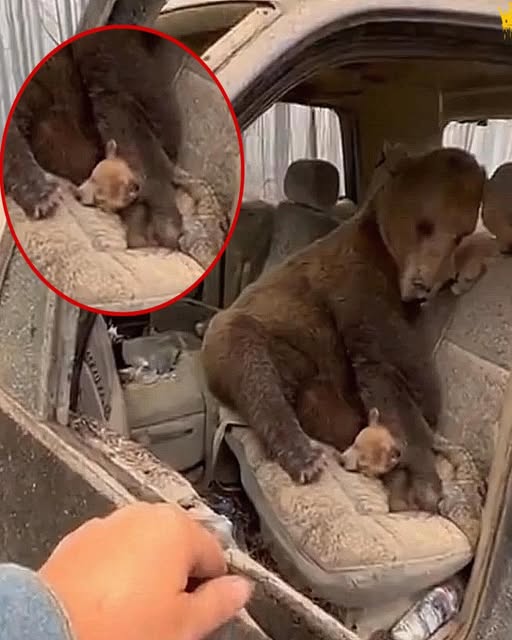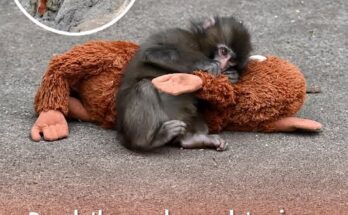
Even in the face of death, she refused to let go.
In the chaos of the Los Angeles wildfires — where smoke turned the sky red and sirens wailed through the night — one police officer discovered a scene so hauntingly tender, it left even seasoned first responders in tears.
He had been patrolling the outer edges of an evacuated neighborhood, scanning for signs of looting. The fires had already consumed miles of homes and hillsides, and with visibility low and exhaustion setting in, he barely noticed the faint crash that echoed through the smoke.
Thinking it might be a break-in, he grabbed his flashlight and ran toward the sound. What he found was something far from a crime — something that would stay with him forever.
Through the haze, a burned-out sedan sat motionless by the roadside, its windows coated in soot. Inside, illuminated by the beam of his flashlight, was a mother bear. She sat perfectly still in the driver’s seat, her large frame hunched protectively over a small, motionless cub at her feet.
For a long moment, the officer couldn’t move. The mother bear’s eyes met his — weary, wet, filled with something unmistakably human: grief.
The cub’s tiny body was covered in ash, its fur singed from the blaze. Fire crews later said it had likely succumbed to smoke inhalation while fleeing the inferno. And yet, the mother hadn’t left it behind. In an act that defied instinct and danger, she had carried her lifeless cub into the nearest shelter she could find — a car — and sat there, waiting.
Not for help. Not for rescue.
Just… unwilling to let go.
The officer stood in silence, the sound of distant crackling flames the only thing breaking the stillness. He didn’t dare approach too close. Every movement he made was slow, careful, as if afraid that any sudden sound might shatter the fragile grief inside that car.
“She wasn’t aggressive,” he later recalled. “She wasn’t trying to run. She just… sat there, holding her cub. Like any mother who couldn’t accept what had happened.”
Wildlife rescue teams were eventually called to the scene. It took hours of patience and gentle coaxing before the mother bear finally allowed them near. Even then, she refused to leave without her baby.
Firefighters and rescuers, many of them fathers and mothers themselves, worked quietly under the glow of headlights. When the cub was finally lifted from the car, the mother followed close behind, her head low, her breathing ragged. She watched as her baby was carefully wrapped in a small blanket — a heartbreaking image that no one there will ever forget.
“She walked beside us,” one firefighter said softly. “Every step, she kept looking back to make sure we still had her cub. It broke every heart on that road.”
Experts later explained that bears, like many animals, experience mourning behaviors — lingering near the bodies of their young, vocalizing softly, even bringing food to them. But what made this moment extraordinary wasn’t just instinct. It was the unmistakable emotion that radiated from her every movement — the refusal to abandon love, even when all hope was gone.
For the officer who found her, the memory still feels like a quiet sermon in the middle of catastrophe.
“In all that destruction,” he said, “she reminded me what love really looks like — fierce, selfless, and unwilling to let go, no matter the cost.”
The wildfires eventually moved on. The car was cleared. The ash settled. But the image of that mother bear — sitting in silence, shielding her cub from a world on fire — became a symbol for many who heard the story.
A symbol of grief.
Of instinct.
Of a love that burns brighter than the flames themselves.


